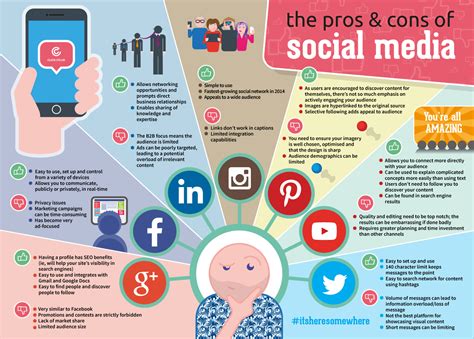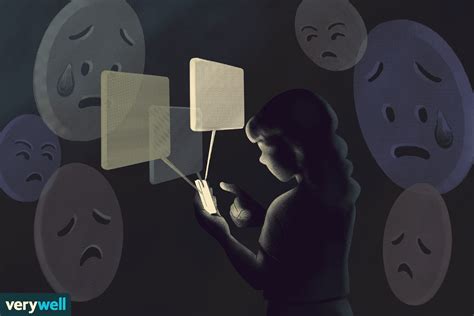In today's technologically advanced era, young individuals are deeply immersed in the vibrant world of online interaction and connection. This digital landscape, characterized by various platforms and networks that facilitate communication and engagement, bears an undeniable impact on the minds and behaviors of teenagers. The omnipresence of social networking sites has revolutionized the way adolescents perceive themselves, form friendships, and navigate through their developing lives. With an increasing number of adolescents active on social media, it is crucial to analyze the myriad effects it has on their overall well-being.
Within this digital realm, the power of social media over teenagers is both commanding and insidious. Social networking platforms have created a virtual universe that amplifies the adolescent experience, influencing their perspectives, emotions, and self-perception. Through the allure of likes, shares, and comments, these platforms have given rise to a culture of validation and comparison. Adolescents find themselves constantly seeking acceptance and striving for recognition in this new social hierarchy, often at the expense of their mental health.
Moreover, the adolescent mind, in its formative years, is highly susceptible to the impressions it encounters. The captivating illusion of social media can blur the line between virtual reality and genuine human connection, leaving teenagers vulnerable to a distorted sense of self. The pressure to conform to societal standards and project an idealized version of oneself can lead to anxiety, self-doubt, and diminished self-esteem. The constant exposure to curated highlight reels may cultivate feelings of inadequacy and heighten the risk of mental health disorders such as depression and anxiety.
While social media undoubtedly presents numerous opportunities for self-expression and connection, it is crucial to dissect the potential consequences it holds for impressionable teenagers. By examining the multifaceted effects social media has on their psychological and emotional well-being, we can strive to comprehend the intricacies of this digital landscape and equip adolescents with the necessary tools to navigate it responsibly and healthily.
The Emergence of Social Networking Platforms and Its Impact on Adolescents

In this section, we will explore the rapid ascent of various online platforms enabling people to connect, share, and interact in the virtual realm. These platforms have significantly influenced the lives of adolescents, shaping their behaviors, attitudes, and relationships. We will delve into the profound impact of these social networking platforms on teenagers, highlighting both the benefits and potential risks associated with their usage.
The rise of social networking platforms has revolutionized the way teenagers communicate and express themselves. These online platforms have become integral parts of their daily lives, providing them with opportunities for self-expression, socialization, and community building. Through these digital channels, adolescents can effortlessly stay connected with friends, family members, and even acquaintances from different corners of the world. Moreover, social media offers a platform for young individuals to showcase their talents, share their opinions, and express their creativity through various multimedia formats.
However, the influence of social networking platforms on teenagers goes beyond its positive aspects. The relentless pursuit of popularity, recognition, and validation on these platforms has given rise to various challenges. Adolescents often find themselves constantly comparing their lives and achievements with others, which can lead to feelings of inadequacy, low self-esteem, and even depression. Additionally, the constant exposure to curated and idealized versions of others' lives on social media can create a distorted perception of reality, causing teenagers to strive for unrealistic goals and standards.
Peer Pressure: Social media provides a breeding ground for peer pressure, as adolescents feel compelled to conform to certain trends, lifestyles, and behaviors in order to fit in or gain acceptance within their online social circles. This pressure can lead to the adoption of harmful habits or engage in risky online activities.
Cyberbullying and Online Harassment: The anonymity and impersonal nature of social media platforms have also facilitated the prevalence of cyberbullying and online harassment among teenagers. The virtual environment provides a sense of detachment, emboldening individuals to engage in hurtful behaviors that they might not engage in face-to-face interactions.
Mental Health Issues: The excessive use of social media has been linked to various mental health problems among teenagers, such as anxiety, stress, and poor sleep patterns. The constant need for validation, the fear of missing out (FOMO), and the pressure to maintain a certain online persona contribute to these issues.
While social media undoubtedly presents numerous advantages, it is crucial to comprehend the potential negative consequences it can have on teenagers' lives. Understanding the impact of these platforms on adolescents is essential in order to devise strategies to navigate their usage responsibly and protect their well-being.
Positive Effects of Social Media on Adolescents' Development
In today's digital era, the influence of online platforms on the growth and maturation of young individuals is becoming increasingly apparent. Rather than solely focusing on the negative aspects often associated with social media, it is crucial to acknowledge the positive effects that it can have on teenagers' development.
Social media platforms provide teenagers with a vast array of opportunities to connect and interact with a diverse range of individuals from different backgrounds and cultures. These virtual connections foster the development of tolerance, empathy, and understanding, as adolescents are exposed to perspectives and experiences that may differ from their own. Social media enables teenagers to broaden their horizons and gain a more comprehensive understanding of the world around them.
Additionally, social media encourages self-expression and creativity among teenagers. Through platforms such as Instagram, Snapchat, and YouTube, adolescents can showcase their artistic talents, share their unique perspectives, and engage in creative collaborations. This fosters the development of their self-confidence and allows them to explore and nurture their individuality.
Moreover, social media platforms serve as a valuable source of information and learning for teenagers. Through blogs, online forums, and educational content shared by experts, teenagers can access a wealth of knowledge and stay updated on current events. This exposure to diverse ideas and information contributes to their intellectual growth and cultivates critical thinking skills.
Furthermore, social media platforms often provide a supportive community for teenagers. Online groups and forums allow individuals with similar interests and struggles to come together, offering a sense of belonging and support. Such communities can be instrumental in bolstering teenagers' mental health and providing them with a safe space to seek guidance and advice.
While acknowledging the potential drawbacks of excessive or inappropriate social media usage, it is essential to recognize and appreciate the positive effects that these platforms can have on the development of teenagers. When used responsibly and with proper guidance, social media can enhance adolescents' growth, foster connectivity, knowledge-sharing, creativity, and emotional well-being.
Negative Effects of Social Media on Teenagers' Mental Health and Well-being

In this section, we will explore the detrimental impact of social media on the mental health and overall well-being of adolescents. We will delve into various aspects of how excessive usage of social media platforms can lead to negative consequences on teenagers' emotional and psychological state.
1. Detrimental Effects on Emotional Well-being
The prevalence of social media in teenagers' lives has given rise to several adverse effects on their emotional well-being. Excessive exposure to social media platforms can contribute to feelings of insecurity, inadequacy, and low self-esteem. The constant comparison to carefully curated online personas and the pressure to conform to unrealistic standards can significantly impact teenagers' emotional health.
2. Psychological Distress and Loneliness
Alongside the negative emotional outcomes, the excessive use of social media can also lead to psychological distress and feelings of loneliness. The constant need for validation through likes, comments, and followers can create a vicious cycle of seeking external approval, which may ultimately leave teenagers feeling disconnected from genuine social interactions and isolated in their virtual worlds.
3. Cyberbullying and Online Harassment
Social media platforms have unfortunately become breeding grounds for cyberbullying and online harassment, posing severe threats to teenagers' mental health. The anonymity and distance provided by these platforms enable individuals to engage in harmful behaviors, leading to emotional trauma, anxiety, and depression for the victims.
4. Sleep Disorders and Addiction
The addictive nature of social media can disrupt teenagers' sleep patterns and contribute to the development of sleep disorders. The constant scrolling, notifications, and the fear of missing out (FOMO) can affect healthy sleep habits, leading to fatigue, decreased concentration, and overall diminished well-being.
5. Impact on Real-Life Relationships
Excessive engagement with social media may hinder teenagers' ability to establish and maintain meaningful real-life relationships. The emphasis on virtual connections and the constant distraction of social media can impede face-to-face interactions and hinder the development of critical social skills, potentially leading to feelings of isolation and alienation.
Conclusion
The negative effects of social media on teenagers' mental health and overall well-being are multifaceted and cannot be neglected. It is crucial for parents, educators, and society as a whole to foster awareness and provide support systems that can help teenagers navigate the digital landscape in a healthy and balanced manner.
FAQ
What are the positive effects of social media on teenagers?
There are several positive effects of social media on teenagers. It helps them stay connected with friends and family, provides a platform to express themselves, and allows for easy access to information and educational resources.
How does social media impact the mental health of teenagers?
Social media can have both positive and negative impacts on the mental health of teenagers. On one hand, it can lead to increased feelings of loneliness, depression, and anxiety due to cyberbullying and unrealistic comparisons. On the other hand, it can provide a sense of community and support for those struggling with mental health issues.
Do teenagers spend too much time on social media?
Many teenagers do spend a significant amount of time on social media. This excessive usage can lead to decreased productivity, lack of physical activity, and a negative impact on face-to-face social interactions. It is important for parents and guardians to set limits and encourage a healthy balance between online and offline activities.
How does social media affect the self-esteem of teenagers?
Social media can have a significant influence on the self-esteem of teenagers. Constant exposure to edited and idealized images can create unrealistic beauty standards and contribute to a negative body image. This can lead to lowered self-esteem and increased feelings of inadequacy.
What steps can be taken to minimize the negative impact of social media on teenagers?
There are several steps that can be taken to minimize the negative impact of social media on teenagers. These include promoting healthy online habits, educating about the risks of cyberbullying, fostering open communication, encouraging a balanced lifestyle, and emphasizing the importance of real-life relationships and activities.



